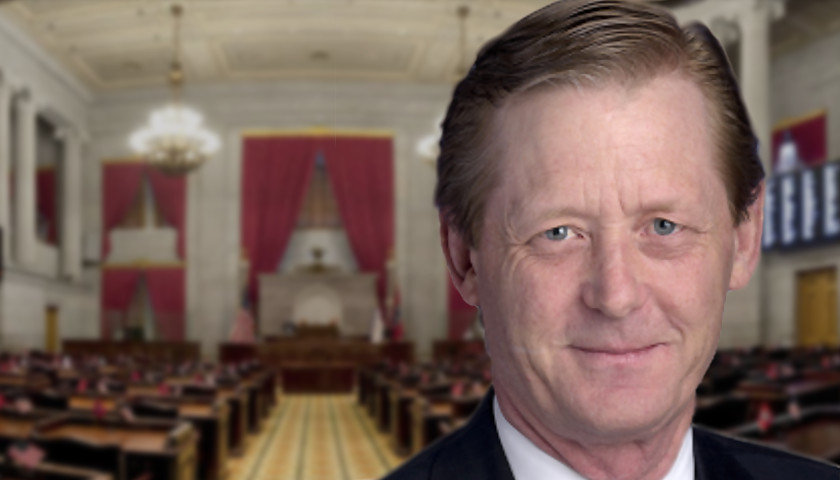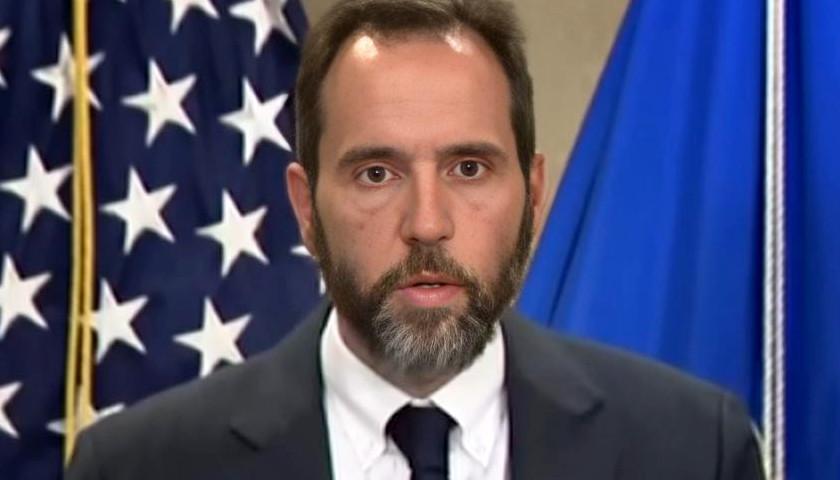In a five-page letter to the state’s attorney general dated May 12, state Representative Bruce Griffey (R-Paris) requested a legal opinion as to the constitutionality and authority of Governor Bill Lee in issuing executive orders in response to COVID-19.
In a press release about his inquiry, Griffey explained, “When I ran for office, I ran on a platform of small government, limited government – a campaign platform I intend to honor. Moreover, when I took my oath of office, I swore to not only support the Tennessee Constitution but also to not consent to any act or thing that shall have a tendency to lessen or abridge the rights and privileges of the people of this state as declared by the Constitution of this State. I intend to uphold my oath of office, and defend the Constitutional rights of Tennesseans and protect them from government over-reach.”
Griffey is a licensed and practicing attorney for 30 years, having served as both an assistant attorney general and assistant district attorney general as well as a federal judicial law clerk.
As such, Griffey told Tennessee Attorney General Herbert Slatery in the letter, he researched the issue for himself and questions the legal authority for the governor to issue four specific executive orders that “close businesses, dictate Tennessean’s healthcare decisions or prohibit people from exercising their right to gather.”
Griffey cited four executive orders along with a brief description of each as follows:
Executive Order No. 17 was issued on March 22, 2020, which among other things, prohibited social gatherings of 10 or more people, directed restaurants bars and similar food and drink establishments to offer only drive-thru, take-out or delivery options and directed gyms and fitness/exercise centers or substantially similar facilities to temporarily close;
Executive Order No. 18 was issued on March 23, 2020, which, among other things, prohibited hospitals, surgical outpatient facilities, and dental providers from performing non-essential medical procedures;
Executive Order No. 21 was issued on March 30, 2020, which, among other things, directed the closure of additional businesses, including businesses or organizations that perform close-contact personal services and entertainment and recreational gathering venues; and
Executive Order No. 30, which allowed certain businesses to reopen and certain Tennesseans to return to work, but required all employers and businesses that choose to open to comply with the governor’s Economic Recovery Group Guidelines for operating safely, as well as general health guidelines from the CDC and other government entities.
Griffey referenced the distribution of powers described in Article II of the Constitution of the State of Tennessee, which divides the powers of government “into three distinct departments: legislative, executive, and judicial” in Section 1.
Section 2 of Article II specifically states as Griffey reminded, “No person or persons belonging to one of these departments shall exercise any of the powers properly belonging to either of the others, except in the cases herein directed or permitted.”
Griffey explained, “In essence, the Tennessee Constitution explicitly provides that neither the executive branch (i.e. the governor) nor the courts can create law. Only the legislative branch can create law.”
“Moreover,” continued Griffey, “nothing in Article III of the Tennessee Constitution, which covers the ‘Executive Department’ and the governor’s powers, permit any legislative power to be given to the governor or permit the governor to exercise legislative power. “
Griffey took it a step further by pointing out, “Notably absent from Article III or any other provision of the Tennessee Constitution is any mention of the power of the governor to issue ‘Executive Orders.’”
As Griffey understood it, Lee claims to been authorized to act under state law, specifically the Emergency Management Powers statute, T.C.A 58-2-107.
Griffey said, “The Tennessee General Assembly exceeded its constitutional authority when it passed this law in 2000 to give the governor legislative power in emergency situations.”
Griffey then connected the dots that have raised questions in the minds of many liberty-minded citizens of Tennessee.
In relying on T.C.A. 58-2-107 to issue the Executive Orders he cited, Griffey stated, “The governor violated the Tennessee Constitution by not only attempting to legislate and create laws that Tennesseans were expected to follow under the threat of prosecution, but also by infringing on unalienable rights guaranteed to Tennesseans by both the U.S. Constitution and the Tennessee Constitution.”
Further on the constitutions, Griffey said “Just as the U.S. Constitution is premised upon the protection of unalienable rights, so too is the Tennessee Constitution.”
As the first ten amendments to the U.S. Constitution are known as the Bill of Rights, Article I of the Tennessee Constitution also sets forth a Declaration of Rights.
Griffey offered pertinent parts of the current 36 sections contained in the Declaration of Rights by including the full text of Sections 1, 8, 21, 23 and 25.
He then goes on to describe how the restrictions and prohibitions contained in the executive orders violate the five sections of the Tennessee Constitution.
“For all the foregoing reasons,” Griffey requested a legal opinion from the attorney general’s office as to:
1. Whether the Tennessee General Assembly exceeded its constitutional authority when it passed T.C.A. § 58-2-107?
2. Whether the passage of T.C.A. § 58-2-107 amounted to an effort to amend the Tennessee Constitution without following the proper procedure to do so by equipping the governor with powers not otherwise delegated to him under the Tennessee Constitution?
3. Whether the governor exceeded his constitutional authority when he issued the above-described executive orders, and
4. Whether the above-described executive orders issued by the governor violated any constitutional rights as guaranteed by either the U.S. Constitution or the Tennessee Constitution to Tennesseans?
Griffey clarified to the attorney general that he is not involved with any pending or potential litigation regarding his request.
– – –
Laura Baigert is a senior reporter at The Tennessee Star.






Even if it should be determined that the governor has acted within legal bounds, I really doubt that, the State Assembly should take action to limit the power for safeguarding our personal freedoms for the future.
Thank God for House Rep Bruce Griffey. The People say, finally! Many have been waiting for this to happen. Truth has to prevail in this volunteer state and our constitution must be upheld. Gov. Lee has been listening to his deep state attorneys and advisors and has come under their control and manipulation. He’s only as smart as his advisors (handlers) and political analysts. You can bet he’s heard from Mr. Vaccine man Bill Gates. The next people to include in all this is the Mayor’s in our Cities and Counties!